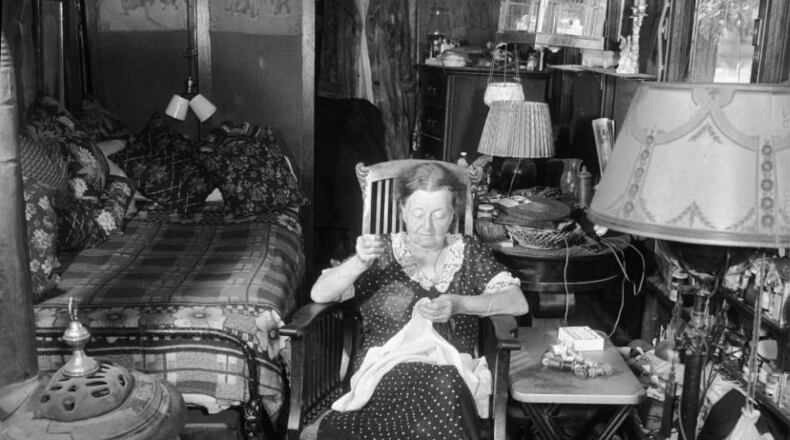Today’s AJC Deja News comes to you from the Sunday, April 25, 1937, edition of The Atlanta Constitution.
WIDOW FINDS CONTENTMENT LIVING IN STREET CAR
Decades before the “tiny house” or “container living” trends, one Avondale Estates woman in her 70s turned an old streetcar into a cozy little home during the Great Depression.
An Atlanta Constitution article found in the back of the “Building and Real Estate” section tells the story of Mrs. Frances E. Zahn, a widow from Wisconsin who converted an abandoned streetcar on squatters ground with the help of friends.
» UPDATE | What became of the woman living in a streetcar
The streetcar is described as “one of the old center-door models” with its wheels and seats removed. The interior was divided into a living room, dining room, bedroom, kitchen and dressing room. Photos of the outside of the building reveal a stove pipe and utility pole, as well as a small wooden shed connected to one end. Windows surrounding the streetcar are covered with drapery.
The article gives a long tour of her tiny space. Here’s an excerpt from the description of the bedroom:
“A daybed, piled high with gay pillows, table and standing lamps, cushioned chairs, bookstands, a radio, six bird cages, pictures and curtains at the windows which hang over shades for additional privacy, are just a few of the furnishings in the car which give it that homelike atmosphere.”
Zahn, who’s called “a clever housekeeper” and “a space economist,” sounds like an early proponent of today’s “tiny house” lifestyle. Her close quarters included a dining room that seated four and a kitchen that was big enough to support her hobby of baking pies. She also created an “art gallery” space where the streetcar’s advertising used to be displayed.
Avondale Estates was only 12 years old when the resourceful Zahn moved close to the center of town. It's safe to say that when the city's founder George Francis Willis planned out an English hamlet with Tudor-style buildings in DeKalb County, he probably didn't include a squatters ground with an abandoned streetcar.
In 1936, Zahn, a widow for 30 years, “found herself with no income, no means of support, no home, but a lot of friends,” according to the article. She may have met her friends in the Avondale Estates area while traveling “for a northern concern” that employed her in earlier years.
Credit: AJC archive
Credit: AJC archive
Yolande Gwin, the Atlanta Constitution reporter who visited Zahn in 1937, had a great eye for Atlanta's eccentrics. Her byline often appeared in the "society" pages but she also wrote for headline news. She authored two books in the 1980s – "Yolande's Atlanta: From the Historical to the Hysterical" and "I Remember Margaret Mitchell."
Zahn died in 1948 and is buried in Madison, Wisc. Two photos from a visit sometime after 1937—perhaps the 1940s—can be found in the AJC Photo Archive at the GSU Library. In those pictures, Zahn's hair is grayer and her home looks more weathered, but she appears just as content as she did in 1937.
If you have any information on Frances Zahn and her time in Avondale Estates, please contact Pete Corson at pcorson@ajc.com.
UPDATE: We have more information on the life of Frances Zahn.
NOTE: An earlier version of this story misdated Frances Zahn's death.
ABOUT DEJA NEWS
In this highly irregular series, we scour the AJC archives for the most interesting news from days gone by, show you the original front page and update the story.
If you have a story you'd like researched and featured in AJC Deja News, send an email with as much information as you know. Email: malbright@ajc.com. Use the subject line "AJC Deja News."
» AJC HISTORY AT YOUR FINGERTIPS: AJCreprints.com | Photo reprints | Content archives
About the Author






